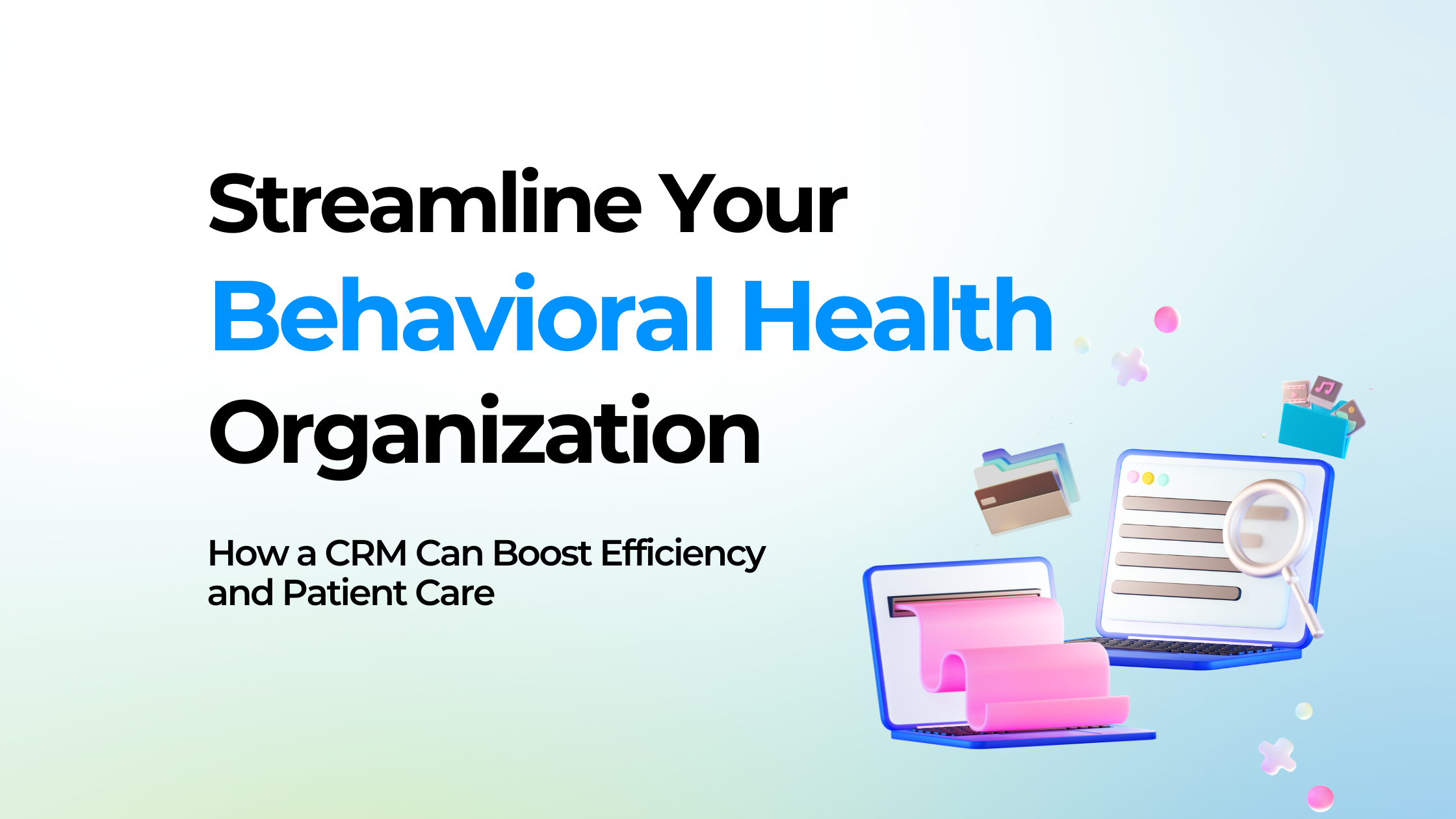By Lal Kumar
October 7, 2024
In today's fast-paced healthcare landscape, behavioral health practices are under immense pressure to deliver high-quality care while managing complex operations. A robust behavioral health CRM can be a game-changer, providing a centralized platform to streamline workflows, enhance patient engagement, and improve overall efficiency.
Challenges Faced by Behavioral Health Practices
Before diving into the benefits of a CRM, let's acknowledge the common challenges faced by behavioral health practices:
- Maintaining Accurate Patient Records: Juggling paper charts, disparate systems, and handwritten notes can lead to errors and inefficiencies.
- Inefficient Appointment Scheduling: Manual scheduling processes often result in missed appointments, wasted time, and frustrated patients.
- Limited Communication: Ineffective communication with patients and healthcare providers can lead to misunderstandings and hinder treatment progress.
- Difficulty Tracking Progress: Measuring treatment effectiveness can be challenging without a centralized system for tracking patient data.
Key Features of a Behavioral Health CRM
A well-designed behavioral health CRM can address these challenges head-on by offering features specifically tailored to your needs. Consider solutions like Dazos CRM, which offers a dedicated platform for behavioral health practices:
- Patient Management: Store and access patient information, including medical history, treatment plans, progress notes, and secure messaging, all in one secure, HIPAA-compliant location. This eliminates the need for manual record-keeping and ensures that all team members have access to the most up-to-date information.
- Appointment Scheduling: Streamline your appointment scheduling process with automated features that allow patients to book appointments online or through a mobile app. Dazos CRM integrates seamlessly with existing calendars and facilitates automated appointment reminders to reduce no-shows.
- Treatment Tracking: Track patient progress effectively with tools that allow you to monitor treatment plans, medication adherence, symptom management, and progress notes. These tools can be customized to your specific treatment modalities and generate reports for easy data analysis.
- Communication Tools: Improve communication with patients, staff, and other healthcare providers through secure messaging, email, and video conferencing features. Dazos CRM offers HIPAA-compliant communication channels, fostering collaboration and ensuring everyone is on the same page.
- Reporting and Analytics: Generate customized reports to track key performance indicators, identify trends, analyze treatment effectiveness, and measure the success of your practice. Leverage this data-driven approach to make informed decisions and optimize your operations for long-term success.
Benefits of Using a Behavioral Health CRM
By investing in a behavioral health CRM like Dazos, your practice can reap numerous benefits:
- Improved Efficiency: By automating routine tasks and streamlining workflows, a CRM can significantly reduce administrative burden and allow your staff to focus on providing high-quality patient care. This frees up valuable time for therapists, counselors, and other healthcare professionals to dedicate more time to patient interaction.
- Enhanced Patient Engagement: A patient-centric CRM can improve the overall patient experience by providing convenient appointment scheduling, personalized communication, secure messaging, and timely updates on treatment progress. This fosters trust and strengthens the patient-therapist relationship.
- Better Collaboration: A centralized platform for storing and accessing patient information promotes collaboration among team members and ensures that everyone has access to the most up-to-date information. This collaborative workflow fosters better teamwork and ultimately leads to improved patient outcomes.
- Improved Outcomes: By tracking patient progress, analyzing treatment effectiveness, and making data-driven decisions, a CRM can help you identify areas for improvement and optimize treatment plans. This continuous improvement approach ultimately leads to better patient outcomes and increased satisfaction.
Conclusion
A behavioral health CRM is no longer a luxury; it's an essential tool for modern practices seeking to improve efficiency, enhance patient care, and drive positive outcomes. By investing in a CRM solution like Dazos CRM that meets your specific needs, you can streamline your operations, improve patient satisfaction, and position your practice for long-term success in today's competitive healthcare landscape.
Ready to explore how Dazos CRM can transform your practice? Visit dazos.com/demo today for a free trial!


